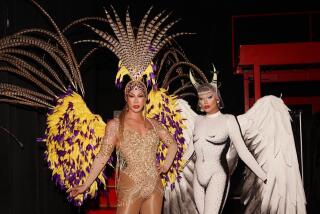Op-Ed: There are three activities I won’t let my daughters try. One is beauty pageants
- Share via
Have you heard? Gretchen Carlson, the former Fox News anchor who took down her boss, sexual harasser Roger Ailes, is the new chair of the Miss America pageant, whose crown she won in 1989. She hopes to “move this iconic program forward,” she wrote on Twitter, after the fallout from the revelation last month that pageant executives demeaned former winners in email.
If you, like me, went on a news diet over the holiday, and missed this major story about a minor institution, consider yourself lucky. It’s vile. Men—and women—in the Miss America management, and on its nonprofit board, engaged in Trump-like banter about “formers,” as ex-winners are called, saying things like “80% of the winners do not have the class, smarts and model for success” and, more ominously, “We also have to punish them when they don’t appreciate what we do for them.”
Elsewhere, they lament that one former winner didn’t die. Still elsewhere, they ask if “we four [are] the only ones not to have” had sex with one specific Miss America. And no, they did not say “have sex.” A far cruder word was used.
Surprised? I’m not. The emails confirm everything I thought about beauty pageants, which is that they put lipstick on the big, ugly pig of misogyny. I have four young daughters, and I’ve always felt that they’re free to do any extracurricular activities, or none at all, with three exceptions: No boxing, no Ayn Rand club, no pageants.
There are activities for women that don’t require thinness, height and wearing bikinis indoors.
As I type, I can hear the counter-arguments. These activities can nurture a strong work ethic, build confidence and provide a supportive social network. They can also provide a glimpse of a bigger world for young people who otherwise might not get out of their neighborhoods or high schools. Think of what a good boxing gym, for example, can do for its participants: promote clean living, help children find mentors, maybe get them to college or the Olympics.
One hears the same arguments in support of beauty pageants. Contestants say that pageants give them skills and confidence. “What kept bringing me back is the skills I acquired competing in pageantry, which is often overlooked,” Leanne Baum, Miss Long Island Teen 2010, told me; she mentioned public speaking as one of the skills she gained. During her tenure she was able to speak to schoolchildren about her latex allergy, and discuss the bullying she suffered from classmates who didn’t believe her allergy was real.
These arguments aren’t wrong, but they are not good arguments, because they’re true of pretty much all human endeavors. Everything that you work hard at builds your work ethic: entomology, origami, chanting Torah for your bat mitzvah, gardening, micro-brewing, Rubik’s Cube, Minecraft. Everything that involves striving teaches that, with striving, you improve.
It’s true that the public presentation, the being-in-front-of-a-crowd, is more specific to pageants. What unites the Q-and-A event and the swimsuit walk (sort of) is training in a certain vague quality that pageant boosters call “poise”—which strikes me as a highly gendered term that has something to do with talking and smiling at the same time. Still, as a former high school and college debater, I know that experience in front of a crowd can help you down the road. And as it happens, many pageant participants go on to careers in theater and television.
But still: Why evening wear? Who even wears evening wear? Why swimsuits? Why swimsuits with heels? There are, after all, activities for women that don’t require thinness, height and wearing bikinis indoors.
There are also activities that encourage women to express political views, rather than making them a hindrance to winning. Politically minded contestants are rare. Texas’ Margana Wood criticized President Trump’s response to Charlottesville; Kate Shingle, Miss America 1998, went on to lead the Actors’ Equity union. But most seem to agree with Laura Marie Kaeppeler, Miss America 2012. When asked if contestants should share political views, she said that “in these economic times, we need to be looking forward to what America needs” and so “Miss America needs to represent all.”
Beauty pageants can help people grow. (And in marginalized communities, there’s a stronger argument that pageants are a form of resistance and fortitude.) But perhaps they can hinder us in certain ways too. In Carlson’s career, for example, one senses that her growing political consciousness is straining against the apolitical mask that her pageant success required.
And the emails remind us that pageants exist in a society that still judges women more than men for their looks. Miss America has to be skinny in that bikini. And if she gains weight after she wins, somebody will mock her—maybe the president of the United States, maybe the head of the Miss America pageant, maybe the pageant’s lead writer, Lewis Friedman, who said that Miss America 2013 Mallory Hagan was eating her way to a career as “a blimp in the Macy’s Thanksgiving Parade.”
For swimsuits, for all I know Friedman would rate a 7. For poise, I’d give him a 4.
Mark Oppenheimer, a contributing writer to Opinion, is the host of Tablet magazine’s Unorthodox podcast.
Follow the Opinion section on Twitter @latimesopinion or Facebook
More to Read
A cure for the common opinion
Get thought-provoking perspectives with our weekly newsletter.
You may occasionally receive promotional content from the Los Angeles Times.










